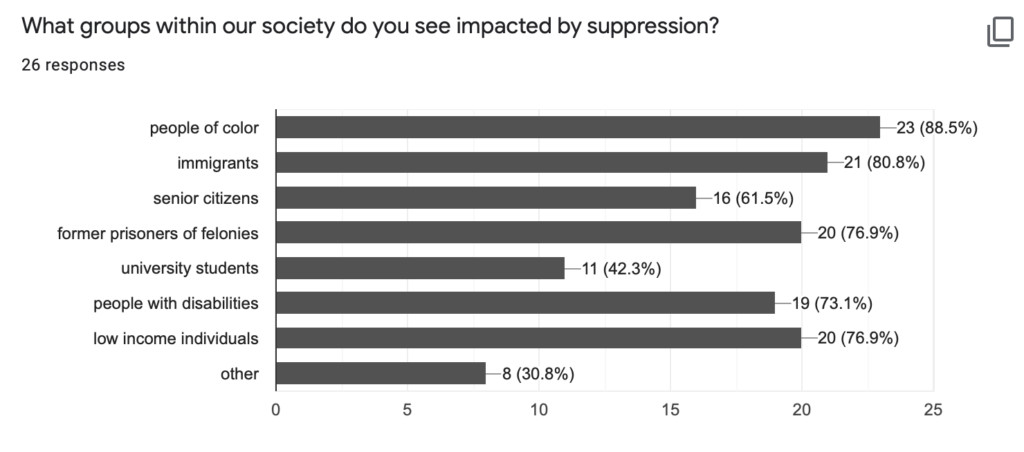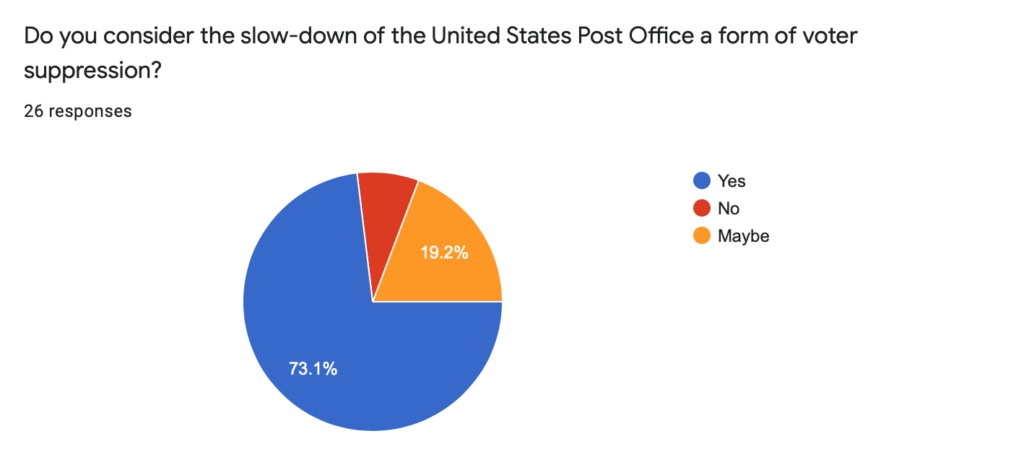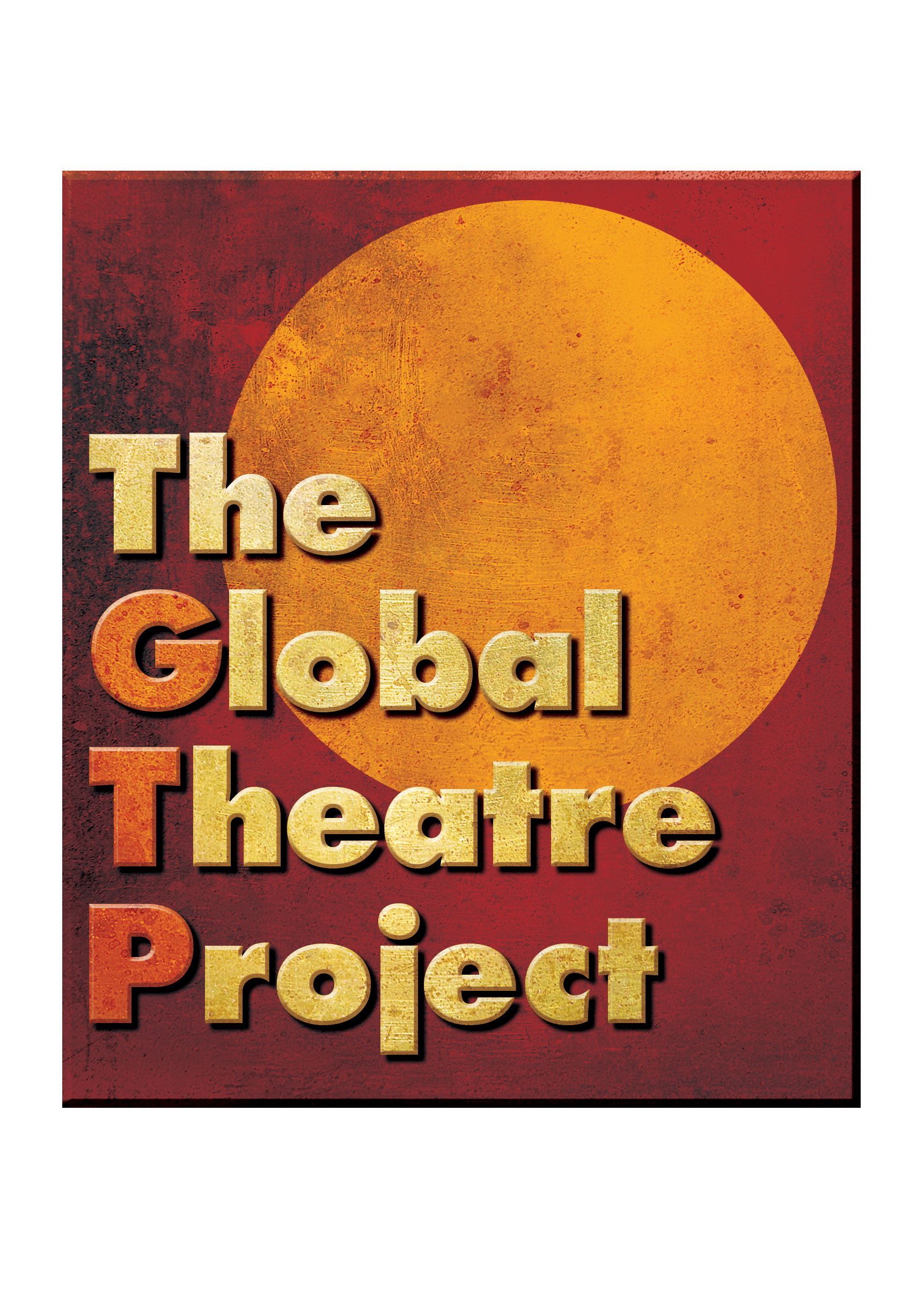Welcome to Our Voice Our Day! an event under the Creative Corps initiative of The Global Theatre Project.
On this page you’ll find information, guidance, research and inspiration to help you create a response to work for the themes of this project. Although the event has come to an end, the materials here give you the opportunity to still engage with these important and on-going issues foundational to Engaged Citizenship.
If you have any questions, or want to contact Artistic Director, Bari, to discuss your project or brainstorm through issues, or to understand the application of The Four Pillars process more clearly, please feel free to contact her or any of the young artists (Kalifa, Jamie, Karrington, Katelyn) spearheading this work at info@theglobaltheatreproject.org or through Facebook, Instagram or Twitter. We also invite you to consider becoming a member of Creative Corps.
As you consider your work keep in mind each pillar and how they relate to your work and the overall project. How deep can you go in the intentionality of what you are creating? And how can it stand firmly on as many of the foundations and the elements as possible in using your voice, your gifts to awaken others? If you want to dive deeper into The Four Pillars we took time during the pandemic to explore each. We have been discussing Kindness, Community and Artistry which you might find interesting and helpful.
Keeping in mind the theme and that the purpose of your work is to inspire discussion and activism, it’s best to put a clear intention in your mind when you start. Or to allow it to develop naturally and then support its further development. Three suggestions are:
- A personal response to the theme
- An effort to deepen other’s thoughts, insights or feelings on the theme
- An expression that inspires discussion and dialogue by presenting questions to be unearthed and confronted
Resources, Research and Raw Materials To Inspire Work for FILL THE BALLOT: Navigating Your Local Election:
Find what is on your ballot locally here at the Vote411.org site.
Following are Research Questions based on the intention of the event: to connect yourself and your audience/viewer to what the actions necessary to fill in your ballot make you feel and can teach you about our government, your connection to your local community and your self. The following questions will help bring light to this task. How do you use your experience of filling in your ballot to make art is a challenge question. Hopefully these questions will help focus you.
- What feelings are you having when looking at the ballot before you fill it in?
- If you voted before, does this time feel different? Why?
- If you’ve been to prior events, how has your thoughts/feelings changed over time as you prepare to vote?
- Considering the time it takes to truly prepare your ballot, what does that mean to you in the context of the rest of your life?
- Who, if anyone, comes to mind when you prepare to vote?
- Who, if anyone, are you voting for – giving voice to – along with yourself?
- What questions arise as you fill in your ballot?
- What does the process of voting (from opening the ballot to the actual vote) feel like to you?
- How much time did it actually take?
- Did you think about the positions or issues you are being asked to weigh in on prior to this election?
- Are you aware of what each position does and how it affects your life and those of your family and community members?
- How do you feel making decisions about the spending of millions of dollars (if you vote on such an amendment)?
- How do you feel making decisions on things that don’t just affect you, does that impact you in any way?
- Do you know where you are voting or where you are taking. your ballot? What does that place look like?
Resources, Research and Raw Materials To Inspire Work for Human Rights and Voter Suppression in 2020 :
Following are Research Questions based on the intention of the event: to Acknowledge, Educate, Raise Awareness, and discuss options and actions for what can occur to combat voter suppression in our time. You are bringing a light to these questions for yourself (or using your project to get clear) and in this way open the possibility for a more articulated and nuanced discussion with others.
- What does voter suppression look like?
- What does it feel like?
- Which groups are still being excluded?
- How do you feel about this?
- How does it make you feel about democracy? About our democracy in the US?
- What (if any) obstacles are in place that need to be pushed against?
- Who are major figures in the fight today?
- What groups are out there bringing attention and action to these concerns?
- Why should we care about voter suppression?
- If you are freely able to vote knowing others aren’t how does that make you feel?
- What are you willing to sacrifice to help others? To ensure others have the same protection?
- What is possible in this country if all votes were equal?
- What if we didn’t have the vote? How would you feel? What would you do?
- What would it mean to you to not have the right to vote?
- How can I tell the story of someone who can not vote in 2020? How can I relate to him or her? Or help others do so?
- What drastic thing, event, or tragedy has to happen to know that the vote matters? To wake up to that?
Following are links to information on voter suppression and actions taken to stop it:
Fair Fight – started by Stacy Abrams whose run for Governor was likely impacted by egregious actions of voter suppression by her opponent and the state itself.
American Civil Liberties Union lists here various forms of voter suppression which they are fighting in the courts throughout the United States.
Voting Rights Alliance lists 61 forms of voter suppression here on this page.


Resources, Research and Raw Materials That Inspired Work for The Long History of Sacrifice: Those who put their lives on the line for our right to vote.
African American Voting Rights and the 15th Amendment
Native American Voting Rights
Here are some more articles that may be helpful (this list will continually be updated):
Carnegie: Voting Rights
When Women Got The Right To Vote
History of the Voting Rights Act
Interactive: who can vote?
These are some of the people who vote for your right to vote
100 Years of Women’s Suffrage
Resources, Research and Raw Materials That Inspired Work for Why I Love, Hate or am Confused About Voting
You can view the Zoom Artists’ Workshop for this theme, which took place on June 30th, here.
Survey Results of 86 young adults on their relationship to voting.
Questions to ask yourself to help you go deeply into your own relationship to voting. Start with “WHY” to understand why we have the relationship we do. To bring a light to it. If you love, hate, are confused or indifferent to voting — why? In getting clear on this (or using your project to get clear on it) there is the possibility for a more articulated conversation with others.
It’s about relationship – oneself to the act of voting and to community.
- When was the first time you voted? Where was it? (details)
- How did you feel?
- When you say you hate/love/am confused by/indifferent to voting what does that mean to you specifically?
- If you never voted in your life from this moment on how would you feel in connection to your community? Your country? How would or wouldn’t it affect your sense of connection to your neighbors or fellow citizens?
- Do you ever think about what a single vote means to your community?
- What has happened to you personally or that you’ve observed that showed you it didn’t matter . . . or that it did.
- Have you ever thought about having ‘a relationship with voting?’ If you imagine that day, Election Day, as a door to step through with others, how would you describe the texture of that relationship? The color? The language that would describe it? The rhythms it would be orchestrated by? What song would be in the backdrop?
- If you took a moment to think about all those who fought for the right to vote, would you walk through the door with some of them? How many people would be with you? What would the feeling be then?
We’re making a series of short interviews that could help inspire you and give you a lot of opportunity for self-reflection and creativity.
Video #1 on “Why I Hate or am Confused by Voting”
Video #2 on “Why I Hate or am Confused by Voting”
Video #1 on “Why I Love Voting”
Video #2 on “Why I Love Voting”
Video #1 on “Why I Am Confused About Voting”
Video of a mother who doesn’t vote but did for her 17 year old.
Survey Results of Duke University – Why So Many Youth Don’t Vote
Social Factors of voting examined by the American Psychological Association.
How Americans Feel About The Country by Age – NYTimes Article
Axios Article on Why Youth Don’t Vote

